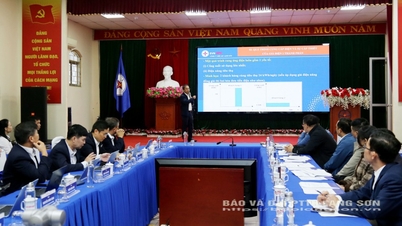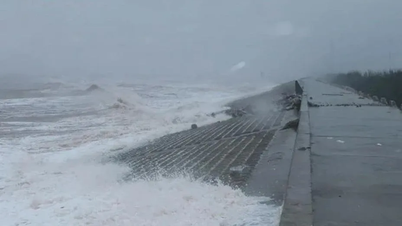State Bank The Regional Branch 2 (NHNN Region 2 - in charge of Ho Chi Minh City and Dong Nai province) has just sent a document to commercial banks in the area to temporarily suspend lending for deposit payments according to the written agreement with real estate brokerage units.
In case these documents are confirmed as legal, the regulator requires banks to only be allowed to lend after establishing specific risk assessment and control processes.
Mr. Nguyen Manh Tuan, a real estate investor in Ho Chi Minh City, said that if banks limit real estate deposit loans through written agreements between customers and brokers, the market will enter a new phase.
According to Mr. Tuan, if banks “tighten” lending, many investors will struggle to solve financial problems. Currently, most investors authorize a third party, a brokerage company, to collect money from customers.

Ms. Dao Thanh Huyen, representative of a real estate company in Ho Chi Minh City, shared that the fact that banks "tighten" lending for real estate purchase deposits through "agreement documents" is protecting investors and people from virtual projects.
According to Ms. Huyen, in reality, many real estate projects that are not yet legal have authorized third parties, brokerage companies, to receive reservations and deposits from people. Some investors often "catch thieves with bare hands", illegally mobilizing capital even though they are not qualified.
According to Ms. Huyen, because they do not meet the conditions for opening for sale, brokerage companies often "circumvent the law" by signing agreements with customers or signing equivalent documents. Some projects do not even have a 1/500 planning but are still opened for sale or cooperate with banks for loans, which is not in accordance with regulations.
“For projects that have a 1/500 planning, a construction permit, have completed the foundation of the project and are allowed to mobilize capital, there are no documents like “agreement documents”. Mrs. Huyen said.
Ms. Huyen shared that for real estate projects with proper legal documents, people only need to sign a deposit contract and a sales contract. After that, the bank will disburse based on the sales contract.
Mr. Tran Thang Long, a real estate expert in Ho Chi Minh City, said that the State Bank is performing its management duties well when issuing warnings to commercial banks. This is a tightening step to protect the interests of investors and people buying real estate.
According to Mr. Long, the legal and financial risks in real estate projects today are very large. If not careful, the consequences will be unpredictable.
According to Mr. Long, to know whether a real estate project is legally valid or not, people need to pay attention to the following conditions: the project must have a 1/500 planning, a construction permit and pay land use fees. When these steps are completed, the project will be licensed to mobilize capital and disburse funds from the bank.
“Reputable and professional investors usually do not let third parties receive deposits. Only projects that are not yet legally qualified use third parties to receive deposits or execute related documents.” Mr. Long said.
Previously, VTC News Electronic Newspaper reported that the State Bank of Vietnam, Region 2 Branch (SBV Region 2 - in charge of Ho Chi Minh City and Dong Nai Province) sent a document to commercial banks in the area, warning about legal and credit risks related to lending to pay for real estate deposits through written agreements between customers and consulting and brokerage units.
According to the State Bank of Vietnam (SBV), commercial banks granting credit to customers to pay deposits based on "written agreements" can lead to serious legal risks.
In case the document is declared invalid, the bank not only has to face prolonged disputes and lawsuits but may also encounter difficulties in handling and recovering debts, especially when the collateral assets associated with the project are not legally complete.
Along with legal risks, the regulator also warns of the risk of bad debt and financial losses. The disbursement of loans to pay deposits to brokers or consultants depends entirely on the progress and legality of the project that the investor implements. If the project is stalled, suspended or not eligible for implementation, the bank may face the risk of losing capital.
In particular, in cases where the bank has not fully assessed the financial capacity of the consulting or brokerage unit or cannot control the disbursement cash flow. For example, if it does not ensure that the deposit can be refunded as committed, the credit risk is even greater.
This not only causes bad debt and processing costs, but also directly affects the financial safety and business results of the bank.
In addition to legal and credit factors, SBV Region 2 also pays attention to reputational risks. When disputes arise between buyers and brokers, customers often believe that the bank has "assisted" in illegal acts, especially in cases where the project is stalled or not handed over on schedule.
Source: https://baolangson.vn/ngan-hang-siet-cho-vay-dat-coc-bat-dong-san-la-bao-ve-nguoi-dan-5062670.html


![[Photo] Prime Minister Pham Minh Chinh chairs meeting on railway projects](https://vphoto.vietnam.vn/thumb/1200x675/vietnam/resource/IMAGE/2025/10/23/1761206277171_dsc-9703-jpg.webp)


![[Photo] President Luong Cuong holds talks with South African President Matamela Cyril Ramaphosa](https://vphoto.vietnam.vn/thumb/1200x675/vietnam/resource/IMAGE/2025/10/23/1761221878741_ndo_br_1-8416-jpg.webp)
![[Photo] Prime Minister Pham Minh Chinh meets with South African President Matamela Cyril Ramaphosa](https://vphoto.vietnam.vn/thumb/1200x675/vietnam/resource/IMAGE/2025/10/23/1761226081024_dsc-9845-jpg.webp)
































































































Comment (0)